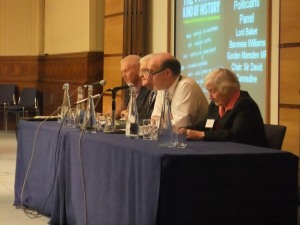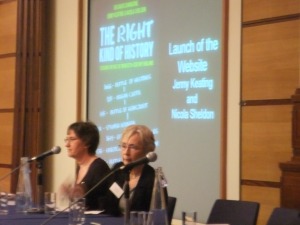 In November 2011 the History in Education project organisers held a conference aimed to disseminate the findings of their research, to publicise the new book and website and to enable discussion about the future of history teaching in state schools. Amongst the many guests was the current Secretary of State for Education Michael Gove MP thereby providing a very current perspective from the heart of government thinking on History teaching in British schools. The resulting podcasts from this conference can be found on the History in Education website on the link below.
In November 2011 the History in Education project organisers held a conference aimed to disseminate the findings of their research, to publicise the new book and website and to enable discussion about the future of history teaching in state schools. Amongst the many guests was the current Secretary of State for Education Michael Gove MP thereby providing a very current perspective from the heart of government thinking on History teaching in British schools. The resulting podcasts from this conference can be found on the History in Education website on the link below.
Conference summary
David Cannadine opened the proceedings with three quotes from the early twentieth century which claimed the exact same complaints over History teaching that are brought up today. Claims that History is in terminal decline and that children do not know what we as adults think they should know are commonplace. What should teaching of History be about? No one agrees as there are so many possible ways to go about it. Cannadine notes the irony that these debates themselves tend to ignore the historical perspective. Without knowledge of what has already occurred in History teaching the discussions become bogged down with repetition, popular assumptions and partially formed ideas that lack justification. There is a golden age myth when it comes to teaching at schools but the project team has found no evidence that it ever actually existed in the teaching of History.
The speech subsequently given by current Secretary of State for Education Michael Gove, seems to parallel that of David Cannadine. Gove is concerned that today’s undergraduate students (as an example) do not know facts about Britain’s past which he feels they should know. Is History education failing to give the young a rounded understanding of the British past? In his opening speech, Cannadine argued that it was not the National curriculum that was at fault – indeed he had found it to contain a good balance – the difficulty in teaching history is more complicated. In a large part, Cannadine argued, the problem lies in the fact that the UK is the only European country to have never made history compulsory to the age of 16. These concerns were also echoed by some of the panelists later in the day –first by the teachers panel, and then subsequently by the politicians panel. Such problems, some argued, has led to subjects being rushed, rehashed, or treated poorly simply due to a lack of adequate time to teach them.
Later in his speech Michael Gove argued that generally what is written in the National Curriculum is rarely what is actually taught in schools. For Gove the problem lies in a divergence between the curriculum and what is required by the exam boards. Citing statistics Gove demonstrated that an incredibly low percentage of exams focused on national history (most focused on Germany or America) and that in many exams there is no pre-twentieth century history at all.
history (most focused on Germany or America) and that in many exams there is no pre-twentieth century history at all.
This issue was brought up several times during the conference but it was also noted that a distinction needed to be made between key stage 3 and GCSE levels where exam pressure was quite different. The post-speech questions and the teacher’s panel both questioned some of these statistics. A survey regarding what undergraduates knew about history derived from a study by Derek Matthews, a lecturer in Economic History at Cardiff University. There was some discussion over the quality of this study and what its findings actually meant. Claims that there were no pre-twentieth century history or a focus only on Germany and America were refuted with claims that various options from ancient times to the present covered 50% of exam marks and that another popular subject was the history of Medicine and Public Health which included a good deal of pre-20th century material.
The panel of school teachers discussed various subjects regarding changes in education, the National Curriculum and issues surrounding the degree of freedom that should be entrusted to individual teachers (a debate over whether or not there should be a prescribed syllabus with no room for choice or deviation). In the subsequent panel of politicians previous Secretary of State for Education Shirley Williams went even further than Gove and others suggesting that the exam boards have too much power over schools and that there needed to be a serious rethink of GCSE and AS/A-Level exams. Williams (and some others on the various panels) fought against the need for a largely British orientated view of history as a means largely for citizenship but for increased emphases on other regions such as China, Africa and Asia. From the various speeches there appeared to be a tension between those arguing for a largely national picture of the past to be taught and those wanting a more wide ranging world perspective.
Further resources:
David Cannadine, Jenny Keating and Nicola Sheldon, The Right Kind of History: Teaching the Past in Twentieth-Century England (Palgrave Macmillan, 2011) Publisher website
History in Education website and conference podcasts
History SPOT History in Education Conference page
(with thanks to Chris Culpin for providing some additional details for the conference summary)

Some inadequacies in this report.
1. Conference Summary, para 2. The survey Mr. Gove quoted for undergraduate ignorance is very questionable and indeed was criticised on the day. This report suggests that he was correct.
Better to read: …today’s undergraduate students (as an example) do not apparently know facts about …
2. Para 3. Again the report takes at face value Mr Gove’s statements. “Citing statistics” won’t do if he got them wrong – for example over German and American history, absence of pre-20th century history.
3. And why no mention of the Teacher Panel?